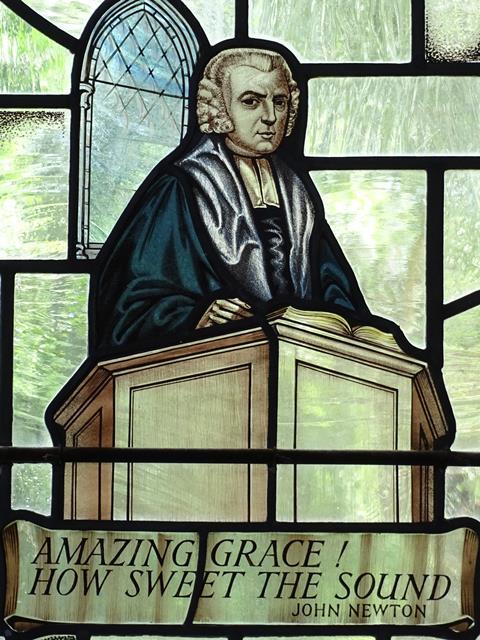As ‘Amazing grace’ marks its 250th anniversary on Sunday January 1st 2023, we look at the story behind one of the world’s most famous hymns and its author, John Newton

Sung at the inauguration of presidents, 9/11 commemorations and memorably recorded by such luminaries as Aretha Franklin and Elvis Presley, you could be forgiven for thinking that ‘Amazing grace’ had its origins on the far side of the Atlantic.
But not so. Its roots lie in the small market town of Olney, in rural Buckinghamshire, and with a former slave trader by the name of Captain - and later Reverend - John Newton.
A life transformed

Newton’s story is a powerful tale of redemption and God’s grace. As a young man, his life was spent at sea. He became part of the slave trade, rising to the rank of captain and transporting slaves from Sierra Leone to the West Indies.
But in 1748, on board The Greyhound, a fierce storm arose off Ireland. Newton, fearing for his life, cried out to a God he barely knew. He promised that, if his life was spared, he would devote the remainder of it to God’s service. The ship survived – barely – and Newton miraculously made land.
In his gratitude, he never forgot his promise to God and committed his life to serving him. Due to his previous life experience and lack of education, it took more than seven years for him to be accepted into ministry in the Church of England.
His first post was as curate at St Peter and St Paul church, Olney - at that time a poor Buckinghamshire village consisting mainly of farm labourers and lace-makers.
Hymns that help
As Newton preached and ministered to his flock, he developed the habit of writing hymns - many with his good friend and local poet William Cowper - to accompany his weekly sermons and help his listeners understand the message. And so it was that, ahead of his New Year’s Day service in 1773, Newton wrote ‘Amazing grace’ to accompany his teaching on 1 Chronicles 17:16-17.
Little did he and his congregation know that his hymn would go on to be so internationally renowned.
The words speak powerfully of Newton’s own personal experience of grace – how God had seen him through toils and dangers; how he had been spiritually lost but yet God had, both physically and spiritually, rescued him and led him home.
The hymn speaks of God’s love and forgiveness, and reminds us that he protects his people
Later, having fully realised the horrors and atrocities that he had been involved in, Newton became heavily involved in campaigning for the abolition of the slave trade.
Moving from Olney to St Mary’s Woolnoth, in the City of London, he began to work with the nephew of a friend, William Wilberforce MP, who lead the parliamentary campaign which would eventually see the slave trade made illegal in 1806. He died a year later, aged 82.
Adapted and added
Since that time the hymn has developed a life of its own. We do not know the tune to which the hymn was first sung; the one we are familiar with today emerged in the mid-1840s in America, perhaps a well-known tune to which many songs were put.
What we now often consider to be the final verse – “When we’ve been there ten thousand years / Bright shining as the sun / We’ve no less days to sing God’s praise / Than when we first begun” - was not actually written by Newton at all. The verse first appeared in Harriet Beecher Stowe’s immensely influential 1852 anti-slavery novel Uncle Tom’s Cabin (Wordsworth Editions), and quickly became assimilated into the hymn.
Newton cried out to a God he barely knew and promised that, if his life was spared, he would devote himself to God’s service
In 1972, ‘Amazing grace’ topped the UK charts with The Military Band of the Royal Scots Dragoon Guard.
And in 2015, President Obama famously sang it unaccompanied after delivering a eulogy for Rev Clementa Pinckney, who was shot dead along with eight members of the congregation, at Emanuel African Methodist Episcopal Church in Charleston, South Carolina.
The song still serves as a great source of comfort to many Christians today, particularly for those who are searching for faith or meaning, or struggling at difficult points in their lives.
Enduring love
And in Olney, where it was first heard and sung on Sunday 1st January 1773, it continues to carry much signifcance. “The hymn speaks of God’s love and forgiveness, and reminds us that he is with us when life is not easy, that he protects his people and has prepared a place for all, with him, for eternity,” says Rev Andrew Pritchard-Keens, current rector of St Peter and St Paul.
“Newton says that he was lost, but speaks of being found by God. He tells us how his eyes were opened to God’s love. My prayer for 2023 is that all who know God will be ever increasingly released to praise him. And all who don’t yet see how much God loves them, will come to know his ‘Amazing grace’!”
As we mark the anniversary of this enduringly popular hymn, it provides a poignant moment to pause and reflect on the grace that has been extended to us all through God’s love; but perhaps also to reflect on how we might extend that grace to those in our communities.
St Peter and St Paul church, Olney, are marking the 250th anniversary of ‘Amazing grace’ with a special service on Sunday 1st January 2023, with guest speaker Rt Rev Rose Hudson-Wilkin, Bishop of Dover, who understands the special relationship that the hymn holds with those of African heritage.


































